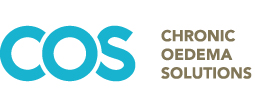COS can point you in the right direction
What chronic oedema solution does your organisation need?
We want to hear from you. Get in touch with us and we will answer any questions you have about the care you provide to manage chronic oedema in the ageing population.
Become a Level 1 Lymphoedema therapist
The COLL Course provides the practitioner with the opportunity to develop their knowledge, skills and clinical reasoning in the management of chronic oedema in the lower limb. Each practitioner brings with them a wealth of knowledge in assessing and managing a variety of health conditions.
This course will utilise and expand upon their current knowledge and skills to facilitate their learning experience. It is hoped on completion it will have stimulated and enticed the practitioner to further explore various aspects of oedema management and their role as a practitioner working in this area.

Prerequisites
This course is open to registered health professionals only (Division 1 Nurses, Medical Practitioners, Occupational Therapists, Physiotherapists and Podiatrists). Please note if you have had treatment for cancer, have lymphoedema or are pregnant please indicate this on the registration form as it may affect your suitability to attend the course.
Click on the headings below for more information
The course is developed around four themes.
Theme 1
The role and development of the practitioner working with chronic oedema in the lower limb.
Theme 2
Knowledge development in the following areas:
- Anatomy and physiology of the vascular and lymphatic system;
- Pathophysiology of chronic oedema in the lower limb;
- Oedema differential diagnosis;
- Assessment of chronic lower limb oedema;
- Psychosocial aspects of chronic lower limb oedema;
- Management of chronic oedema in the lower limb.
Theme 3
Chronic oedema skill development in the following areas;
- Assessment;
- Treatment of lower limb chronic oedemas.
Theme 4
Applied practice. The focus of this theme is in developing skills that are required for clinical practice. It integrates elements from the other 3 themes and has a focus on clinical reasoning.
The key characteristics of the COLL course curriculum are:
Continuum of Health Professional Education
The course provides opportunities for developing the practitioner’s education in chronic oedema management taking into account their profession and at the same time acknowledging that each practitioner will bring to the course expertise and knowledge in a variety of areas.
Cased Based Learning
The course is underpinned by the exploration of chronic oedema management through case studies that will facilitate integration of information and skills to specific chronic oedema conditions. This will facilitate an authentic learning experience.
Interdisciplinary Care
The course fosters an appreciation of interdisciplinary teamwork and explores the roles and the development of practitioners across professions. The participant will have specific areas of expertise that they can draw upon and assist other learners.
Integrated Curriculum
The goal of the integrated curriculum of this course is to bring the learner beyond skill and concept acquisition to creativity and evidence based decision-making and implementation in practice.
Maree O’Connor
Maree O’Connor is a physiotherapist and has over 30 years experience in the area of lymphoedema management and also physiotherapy following breast cancer. She has been delivering lymphoedema courses, workshops, seminars and speaking at both national and international conferences since 1994 and has a graduate certificate in health professional education …read more
Jan Rice
Jan trained at The Alfred hospital and progressed through various training programs to eventually study Plastic Surgery Nursing. This led her into wound management in a formal sense in 1993 when she joined Wound Foundation of Australia. She holds a Masters in Wound Care …read more
Dr Sue Hodson
Medical Officer, Lymphoedema Services, Ballarat Health
Susan is an inspirational educator and an experienced GP who gained experience in the field of Lymphoedema while working at Mercy Lymphoedema Clinic, from March 2003 – Nov 2007 …read more
Sarah Harmon
Sarah Harmon is a physiotherapist with over 20 years of clinical experience in lymphoedema management, having worked in both the public and private setting …read more
The course is divided into sections. Each section has a distance learning component and a face to face component. The course is underpinned by evidence based learning and the content reflects the current best practice in chronic oedema management.
Distance Learning Component
The distance learning component is included via Lymphoedema Educations Solutions (LES) online Learning Management System and via the e-learning modules provided by internationally recognised Klose Training www.klosetraining.com and 3M. It includes readings, online presentations and activities to assist you in developing knowledge on various topics. Your prior learning will influence how much time you will need to spend on each section. There are some activities that will require you to participate in an online discussion with other course participants. The distance learning component is compulsory and will prepare you for the face-to-face study days. It is estimated that the Klose online training can take up to 24 hours to complete and the 3M online module 6 hours. There are approximately another 15 hours of learning via the LES Learning Management System. You will be given access to the distance learning program approximately 6 weeks prior to the face to face study days.
The Klose and 3M e-learning component will also include formative online quizzes which you must achieve 80% and you have three chances at achieving this. There will also be a variety of short quizzes, pair and share and activities at the beginning of various sessions on the study days to formatively evaluate your learning from the distance-learning component.
As you work through the online modules you will be asked to complete the Klose Training home study module, the 3M modules or visit various websites to complete activities.
The Klose training and 3M modules must be successfully completed prior to the face-to-face days. This is a prerequisite to attend the face-to-face study days.
Face-to-Face Component
The face-to-face component is made up of 4.5 study days (40 hours). Dissemination of information and skills is via interactive lectures, activities, practical workshops and group discussion. It is an excellent opportunity for you to share your knowledge, skills, ideas and have a forum to troubleshoot a variety of aspects of chronic oedema management. The information for the face-to-face component will be given out on the face-to-face study days.
Participants are required to have 100% attendance throughout the face-to-face component.
The assessment of this course assists the learner in integrating what has been taught. The assessment includes both formative and summative components. There will be a number of opportunities for formative assessment (feedback) both in the distance learning and face-to-face components.
Formative Assessment:
- Facilitates the development of self-assessment (reflection) in learning;
- Encourages educator and peer dialogue around learning;
- Provides opportunities to close the gap between current and desired performance;
- Delivers high quality information to participants about their learning;
- Encourages positive motivational beliefs and self-esteem; and
- Provides information to educators that can be used to help shape the teaching.
Summative Assessment
The summative assessment tasks allow the learner to show that they have gained mastery of content, knowledge, and skills. It is another opportunity for the learner to be aware of what they have a good grasp of and what requires further exploration.
The summative assessment will comprise of:
- Online quizzes for each of the online modules of Klose Training and 3M;
- Practical examination of manual lymphatic drainage and bandaging for a specific case study;
- Objective structured clinical examination (OSCE) that will have three stations which will assess the following topics:
- Fitting a compression garment and teaching the examiner how to apply and remove it with appropriate home instructions;
- Measuring the circumferences of a limb and locating the pedal pulses;
- Theory examination.
- Case study assignment that will be due 4 weeks after completion of the face-to-face study days. This will require the practitioner in their workplace to assess and develop a treatment plan for a client with chronic lower limb lymphoedema. Detailed assessment criteria will be provided.
Upon successfully completing the course the participant will be provided with a certificate of completion.
Participants who fail any part of the summative assessment will need to be re-examined in that part within six months of the original exam at the participant’s expense. If the participant fails again it is recommended that the participant repeat the entire course. If the participant is unable to meet with the instructor for the exam due to geographic reasons then a suitably qualified instructor will be appointed to officiate at the examination.
This course requires a minimum number of 14 participants and has a maximum number of 20.
- Access to the comprehensive LES online Learning Management System, which provides an interactive and collaborative environment
- Klose and 3M online training
- Course material for the face-to-face component
- The opportunity to develop a wide variety of skills in oedema management including assessment, manual lymphatic draining, basic wound management, compression bandaging, fit and experience applying compression garments
- Exploring other treatment options such as compression wraps and intermittent pneumatic compression
- Resources to enable you to get started upon successful course completion
- Access to companies that provide products used in chronic oedema and wound management
- All morning / afternoon teas and lunches during the face-to face component
Upon successful completion of the course, after the mentoring program has finished, the participant will be provided with a course certificate for 85 hours of continuing professional development.
Mentoring Program
LES offers a unique opportunity to participate in small group online mentoring sessions to discuss their current cases over a 6 month period on completion of the course. This provides participants with a chance to further improve clinical reasoning and management of clients.
ALA Standards
This course is accredited by the Australasian Lymphology Association (ALA) in accordance with the ALA’s Competency Standards and upon successful completion of this course, the participant will be eligible to apply for accreditation under the ALA Accredited Lymphoedema Practitioner Program. Details can be found at https://www.lymphoedema.org.au/accreditation-nlpr/
Need help to navigate chronic oedema management?
COS can point you in the right direction

